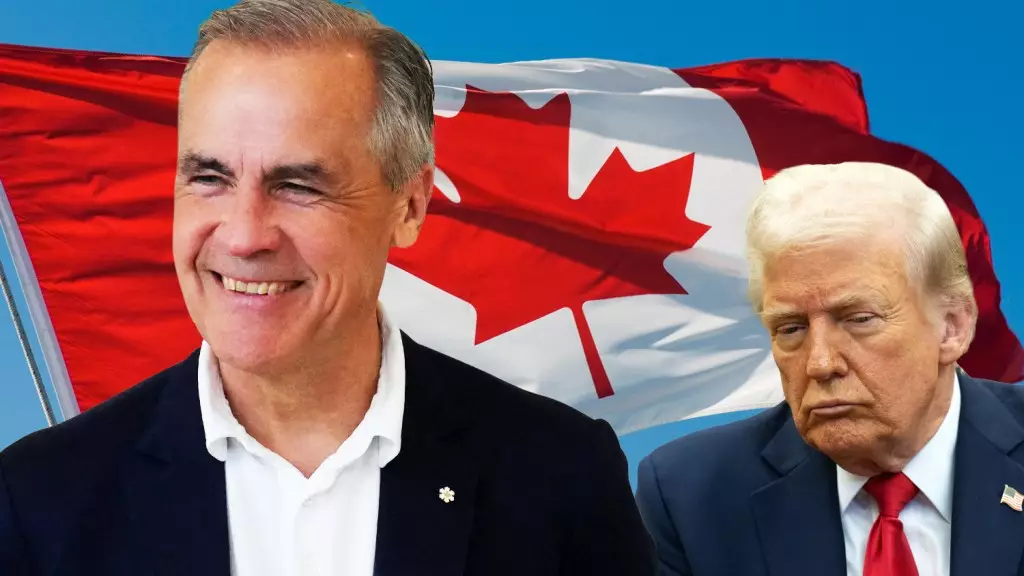In a significant electoral turnaround, the Canadian Liberal Party, now led by the astute Mark Carney, maintains its grip on power following the latest election results. This political achievement is particularly striking given the dire predictions that surrounded the party not long ago. The election has taken place against a backdrop of national tragedy, with the nation mourning the violent loss of life during a Vancouver street festival. The juxtaposition of a nation in grief and a political party celebrating its survival serves as a reminder of the complexity and volatility of a country’s leadership dynamics.
Minority Government: A Fine Balancing Act
With 147 seats secured in a 343-seat Parliament, the Liberals find themselves in a minority position once again, capturing their fourth consecutive term. While this marks a commendable win for the Liberals, it still brings challenges; they are short of the 172 seats required for a majority government. The path to governance will involve navigating a complex array of stakeholders and interests, as smaller parties faced significant losses, narrowing the field to a two-party parliament. The opposition Conservatives, led by Pierre Poilievre, garnered 104 seats, a much weaker position than they once commanded, raising questions about their future strategy.
The Path to Victory: From Defeat to Determination
The election results signal a remarkable political comeback for the Liberals, especially when considering the polls mere months prior, which showed the Conservatives leading by more than 20 points. The ascent of Mark Carney, previously not elected to any public office and notable for his tenure as the Governor of the Bank of Canada and the Bank of England, has brought a new vigor to the party. His candidacy hinged on a promise to protect Canadian interests, particularly in the face of aggressive actions from former President Donald Trump. Carney’s leadership captured the spirit of resilience in Canada, effectively framing the election discourse around national sovereignty and integrity.
While the hiring of prominent Canadian personalities like Mike Myers and Neil Young, who championed the “Canada Is Not For Sale” slogan, was a brilliant marketing ploy, it underscored a movement that resonated deeply with voters. This was more than an election—it was a rallying cry against external pressures that sought to undermine Canadian autonomy.
The Campaign’s Unfolding Drama
The political theater played out dramatically, with the campaign narrowing into a one-issue contest with identity at its core. The persistent condemnation of Trump’s tariffs and vocal challenges to his governance were not merely strategic moves; they were integral to framing the narrative for disillusioned Canadians who felt cornered by external political maneuvers. The campaign crystallized feelings of patriotism, which invigorated the electorate, transforming a seemingly foreboding political landscape into one that thrived on principles of self-determination.
Amidst the election’s excitement and the strategic tumult unfolding on the political stage, technology played a surprising role. On Election Day, Elections Canada’s website experienced a shutdown, creating a palpable sense of suspense as results were delayed. As voters waited anxiously for the outcome, this technological snafu inadvertently underscored the importance of transparency and the need for reliable systems in democratic processes.
Future Implications: Navigating Uncertainty
While the Liberals celebrate this latest electoral victory, the road ahead is fraught with challenges that will test the resilience and adaptability of Carney’s leadership. With a coalition of diverse views within the remaining parties, the challenge will be in crafting effective policies that address the immediate concerns of the electorate while also preparing for the long-term economic implications of a fragile political landscape. The obligation to respond to domestic needs while mitigating external threats, particularly those stemming from an unpredictable neighbor, will require innovative governance.
As Canada emerges from this election cycle, the Liberals’ ability to unite a divided Parliament will be pivotal. The essential pillars of their governance will not only focus on economic rebuilding but also address the healing needed within the fabric of Canadian society marked by recent tragedies. The implications of this election stretch far beyond governmental power; this is a significant milestone in the ongoing narrative of Canadian identity, resilience, and the fight for sovereignty in a constantly evolving political climate.


Leave a Reply